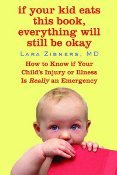So many questions, so many worries. What to do when the baby is sick? Or when the baby chews on something? Fortunately, here are some solutions to help getting back your sanity.
"If Your Kid Eats This Book, Everything Will Still Be Okay," by Lara Zibners (Wellness Central, 2009, $14.99)
New moms obsess over the need to protect a tiny, fragile new baby from all of the dangers of the world. This book offers an excellent source of reassuring advice that can help new moms avoid that 10th call to the pediatrician in one week. Of course, if you feel like you need to call to speak to a nurse, then call, because it will certainly make you feel better. But you might want to check this book first. From information about digestive upsets to bumps on the head, this book gives you practical tips about when to worry and when not to.
"The Happiest Baby on the Block," by Harvey Karp (Bantam, 2003, $15)
Believe it or not, most babies are not born knowing how to sleep well. "The Happiest Baby on the Block" offers steps for easing the transition from the womb to the real world.
By recreating comforting elements of a baby's life before birth, this book helps parents create an environment that is more conducive to healthy newborn sleep with easy tools such as swaddling blankets, slings, swings and white noise.
Karp's gentle sleep tips will not only help baby sleep, they will help mom get crucial hours of rest as well. And that should make everyone happy.
"Baby Play," by Wendi Masi and Roni Cohen Leiderman (Creative Publishing International, 2001, $16.99)
Newborns don't do a whole lot besides eat, sleep, cry and poop. If you're uncertain about what to do with your new bundle of joy in between her frequent naps, this is an excellent book to consult. "Baby Play" offers a wide variety of suggestions about how to entertain your baby and get her learning from day one. With easy, evolving activities for each developmental stage, this book serves as an excellent guide to helping your baby grow and learn through play. The same authors also have a companion book called "Toddler Play" that is similarly useful once your baby gets a little older.
"The Breastfeeding Book: Everything You Need to Know About Nursing Your Child from Birth through Weaning," by William Sears (Little, Brown, 2000, $14.99)
If you are planning to breastfeed, Dr. Sears' comprehensive guide is a must-have, including basic information for getting started as well as troubleshooting advice for many different problems that could come up at various stages of the breastfeeding relationship.
If you are planning on nursing at work, "The Breastfeeding Book" also includes helpful information about expressing milk. You may also wish to consider purchasing "The Milk Memos: How Real Moms Learned to Mix Business with Babies—And How You Can, Too," by Cate Colburn-Smith and Andrea Serrette (Tarcher, 2007, $13.95), which offers advice and anecdotes from real moms in the trenches who have been there and done that.
"The Working Gal's Guide to Babyville," by Paige Hobey and Allison Nied (Da Capo Press, 2006, $15.95)
Any mom who plans to go back to work after the birth of their child needs to be prepared for the variety of challenges that they may face, logistical, emotional and otherwise. "The Working Gal's Guide to Babyville" offers practical, accessible tips, as well as timetables and lists to keep working moms-to-be organized and prepared for their baby's birth and beyond. It also answers the elusive question that has plagued parents for many years: How many onesies does a baby actually need?
Another excellent working-mom title is "The Working Mother's Guide to Life," by Linda Mason, which is out of print but widely available used.



Comments
Use the comment form below to begin a discussion about this content.
comments powered by Disqus